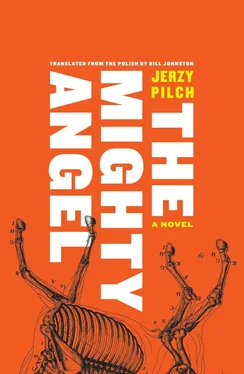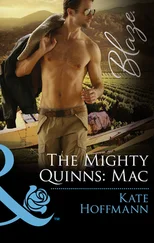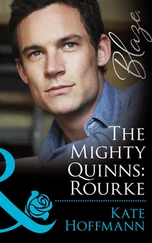Jerzy Pilch - The Mighty Angel
Здесь есть возможность читать онлайн «Jerzy Pilch - The Mighty Angel» весь текст электронной книги совершенно бесплатно (целиком полную версию без сокращений). В некоторых случаях можно слушать аудио, скачать через торрент в формате fb2 и присутствует краткое содержание. Год выпуска: 2009, Издательство: Open Letter, Жанр: Современная проза, на английском языке. Описание произведения, (предисловие) а так же отзывы посетителей доступны на портале библиотеки ЛибКат.
- Название:The Mighty Angel
- Автор:
- Издательство:Open Letter
- Жанр:
- Год:2009
- ISBN:нет данных
- Рейтинг книги:5 / 5. Голосов: 1
-
Избранное:Добавить в избранное
- Отзывы:
-
Ваша оценка:
- 100
- 1
- 2
- 3
- 4
- 5
The Mighty Angel: краткое содержание, описание и аннотация
Предлагаем к чтению аннотацию, описание, краткое содержание или предисловие (зависит от того, что написал сам автор книги «The Mighty Angel»). Если вы не нашли необходимую информацию о книге — напишите в комментариях, мы постараемся отыскать её.
A simultaneously tragic, comic, and touching novel,
displays Pilch’s caustic humor, ferocious intelligence, and unparalleled mastery of storytelling.
The Mighty Angel — читать онлайн бесплатно полную книгу (весь текст) целиком
Ниже представлен текст книги, разбитый по страницам. Система сохранения места последней прочитанной страницы, позволяет с удобством читать онлайн бесплатно книгу «The Mighty Angel», без необходимости каждый раз заново искать на чём Вы остановились. Поставьте закладку, и сможете в любой момент перейти на страницу, на которой закончили чтение.
Интервал:
Закладка:
•
On the evening of Christmas Eve the preceding year Simon Pure Goodness had awakened from an unexpectedly deep sleep. For years he had not slept deeply; the dream of a deep sleep is the greatest dream of every drunkard. “What I personally think,” said Simon, ruffling his straight blond hair and gazing at us with those permanently surprised vitreous blue eyes of his, “what I personally think is that delirium can be explained by sleeplessness, that it’s a function of sleeplessness. Because I mean, many a person’ll get royally sozzled, many a person will get sozzled like each of us in our prime, or even worse, and what happens? Nothing. He sleeps. He sleeps the sleep of a righteous drunkard, he sleeps twelve hours, twenty-four hours, he sleeps a whole day or two whole days. Three days and three nights he sleeps like a dead man, and in his sleep he burns up all his drunken badness. Whereas here you have a person without sleep, a sleepless person, he’s gotten sozzled as the Devil intended, and he doesn’t sleep at all or, what’s even worse, he wakes up after two or three hours of unprincipled sleep, paradoxical sleep, sleep that’s unconscious even though it’s shallow. You wake after two or three hours and you’re neither sober nor drunk, you can’t stand but you can’t lie down either, your trembling hand won’t reach for a nineteenth-century novel so you can calm yourself with a little harmonious reading, you’re not capable of reading, the light dazzles you and you’re afraid of the darkness, there is nothing, nothing all around you, it’s as if you were inside a spinning shell of nothingness, there’s no succor from anywhere, no salvation, nothing but your hand crawling like an ignoble reptile, like an iniquitous snake, in search of the bottle that’s placed oh so providently at your bedside, and you raise the bottle, and you drink with despair in your heart, because you know that only bad things will come to you. And you drink there in the nothingness, in the darkness, in solitude, you drink for a phony and transient sense of relief, because amid all these worst things, it seems to you that the least worst of all is another hour of unprincipled sleep.”
When Simon, then, woke from his unexpectedly deep sleep, he was amazed at what had happened, at how such a deep and such a calm sleep had been possible at such a time, when he was in such a condition? He rose, crossed to the window, and opened the window; it was a frosty Christmas night, with dawn not far away. The sky was composed of a billion evenly arranged bottles; a billion streams of clear Scandinavian vodka were pouring from a billion opened and at the same time forever full bottles, and a half-inch layer of alcohol covered everything: the moon, the stars, the snow; the universe smelled of clear Scandinavian vodka. The bottles clinked faintly; then there was a sleigh flying through the air like an airplane, and sitting in the sleigh, in a gold track suit, was God.
“Why am I unhappy?” asked Simon.
“That’s how things worked out,” replied God, “that’s how the accounts worked out. If you didn’t drink you’d be happy, but you wouldn’t understand much.”
“I don’t want to understand. I want my hands to stop shaking and my heart to stop palpitating.”
“Properly speaking it’s too late”—God tipped his gold baseball cap back on his head—“but if you wanted to, if you wanted to, then you could. The question of free will”—God gave a cough—“the question of free will has been analyzed from every angle to the point that my exegetes know me better than I know myself, though there’s nothing wrong with that, exegetes are supposed to know everything. I know everything, though I don’t know everything; for example I don’t know everything about my own subconscious, which is unmistakable proof that I have one. Does God have a subconscious? He does. He does, because he hasn’t the faintest idea about it; if he did, it wouldn’t be a subconscious. .” God broke off and grew visibly dispirited; his thoughts must have been exceedingly bitter. “At every step, at every step there are these exhausting paradoxes. . Yet things are simple, even the question of free will is simple.” God looked at Simon. “You don’t have to study it, there’s no need to read about it. Although”—God paused a moment—“although you might read Augustine one day when you’re a little less hung over than usual. . Really it’s too late, but if you wanted to then you could. The effort required is considerably less than you think; the thing is, you have to truly make that small effort and see it through to the end. When the urge takes you and you say to yourself, I need a drink, think to yourself that you don’t need it, tell yourself you don’t need it, and do this: don’t force yourself to drink. Because the fact that you ‘need a drink’ means that you drink out of need; avoid that need, force yourself to not-need. Don’t drink the next day. Just don’t drink the next day. Don’t drink the next day, either in the morning, or in the afternoon, or in the evening. You don’t need to. Don’t drink the next day and that’s all it takes. Catch you later”—God clicked his tongue and the sleigh moved slowly off—“catch you later. We, by the grace of ourselves, are off to other hotspots around the globe.”
This time Simon Pure Goodness (in civilian life a law student) told about an encounter with God, but in earlier variants of his story, the flying sleigh contained either the Angel Gabriel, or Santa Claus, or one of the wise men of this world and kings hastening to Bethlehem by this atypical means of transportation. Simon was not sure; it was only a year later, when he would go mad, when he would decide he was the incarnation of John the Baptist, don shabby small-town garb, and walk across Poland in the heat and rain and wind, announcing the Second Coming and the destruction, it would only be a year later that he would acquire absolute certainty that the sleigh contained the angel, the same Angel Gabriel who said to Zacharias: Your son shall drink neither wine nor strong drink; and he shall be filled with the Holy Ghost.
The heavenly visitor was disappearing in the icy distance, while through Simon there passed a gentle torrent of benevolent movement, a kindly stream of mild clouds. He could clearly sense within himself a great commotion, and for the first time it occurred to him that that which was inside him was holy. Even if I’m only hearing the murmur of my own blood, that too means I am chosen. But it was not the murmur of his blood, nor disagreeable swings in blood pressure; this was not a stiffening of the innards that heralded a collapse, nor an asthmatic attack, nor a fever, nor the shivers. The Divine Mill was slowly starting to turn in Simon’s heart, while he comprehended fully that labors now awaited him, that he would have to serve the heavenly windmills and angelic millstones that had appeared in the depths of his soul.
We were sitting at the table: myself, Don Juan the Rib, Fanny Kapelmeister, the Queen of Kent, Simon Pure Goodness, Columbus the Explorer, and the other less determinate characters. Don Juan the Rib, in civilian life a hairdresser, and, additionally, a musician, would die a few months later; I would attend his funeral. Simon Pure Goodness would go mad; the Queen of Kent’s ashen hair would in a short while turn completely to ash; Columbus the Explorer, in civilian life a professor of social sciences, would attempt to return to his former life, which no longer existed, in the hope that he might succeed.
That’s right: civilian life, in civilian life, I keep desperately repeating this military phraseology. Our lives before the habit were civilian lives; in those lives we had undevastated homes, our mothers were alive, our wives and fiancées and children were by our side. We ate lunches and dinners and breakfasts. In those lives we could distinguish different dishes, different times of year, and different times of day. We fell asleep in the evening, woke in the morning, and pottered about in our workshops that were as yet undestroyed by fire. The comprehensible and impassive city stood there in its pigeon-gray cloud, the smell of coffee and exhaust fumes filled the streets, a young woman in a yellow dress was pausing in front of a window display, even if we only thought so; we existed. We read newspapers, browsed in bookstores, listened to music; we enjoyed ice cream with chocolate syrup, and watched soccer, and rode streetcars. But all that had passed, it had vanished; for many years now a great war had been going on, we were soldiers of a defeated and besieged self-styled army, against the dictates of common sense we refused to surrender, for many years now we had had nowhere to retreat to and no word came from our homes, while the dark ring of diabolic forces was inexorably closing in. We fell asleep with our forehead resting against the nearest earthworks; we were woken by the cannonade of our heart, we had been wearing the same uniform for who knew how long, we ate whatever we could find, it was only by some miracle that our canteens were always full, and an ever more primitive rotgut sustained our ever shorter lives. Don Juan the Rib started playing his mouth organ again; this time he played the melody of an uncommon, long-forgotten carol. I had heard it before — someone close to me used to sing that melody and play along on the piano. Perhaps my grandfather, Old Kubica, sang it as he walked across the square? Perhaps you are humming it as you lay an empty plate on the white tablecloth? Perhaps the almost completely black cat on the windowsill is listening to that carol in an unoccupied home?
Читать дальшеИнтервал:
Закладка:
Похожие книги на «The Mighty Angel»
Представляем Вашему вниманию похожие книги на «The Mighty Angel» списком для выбора. Мы отобрали схожую по названию и смыслу литературу в надежде предоставить читателям больше вариантов отыскать новые, интересные, ещё непрочитанные произведения.
Обсуждение, отзывы о книге «The Mighty Angel» и просто собственные мнения читателей. Оставьте ваши комментарии, напишите, что Вы думаете о произведении, его смысле или главных героях. Укажите что конкретно понравилось, а что нет, и почему Вы так считаете.












